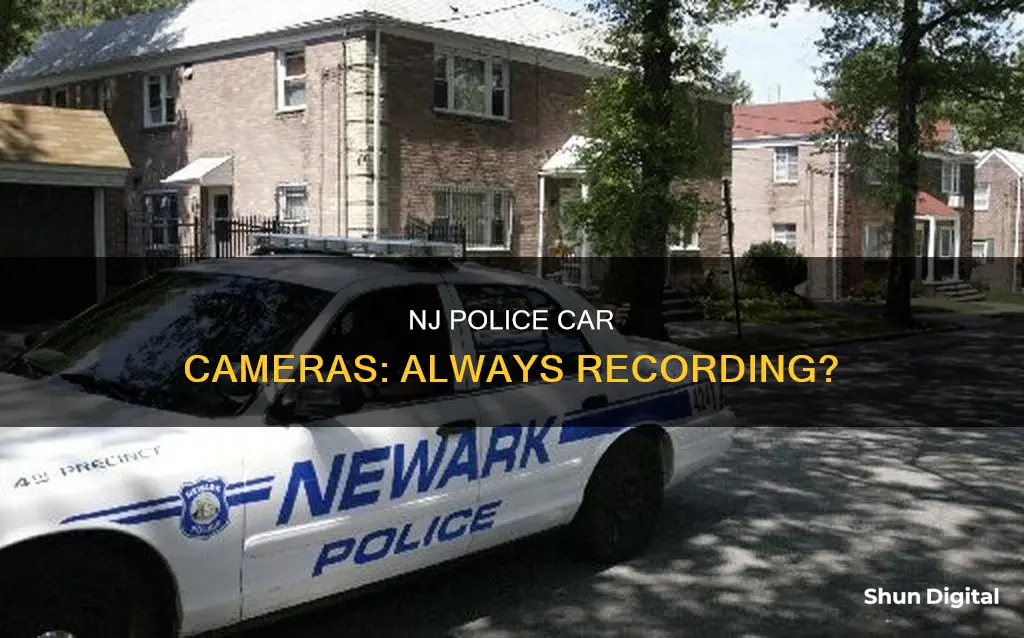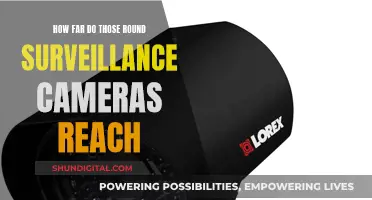
In the wake of the George Floyd case, New Jersey has mandated that all police officers wear body cameras. This has been touted as a step towards rebuilding community trust in law enforcement. While some officers were initially reluctant to wear body cameras, many have changed their minds, and the cameras have been shown to have a positive impact on police behaviour. However, there is still some debate about the rules governing their use, with some arguing that officers should not be allowed to review footage before writing their reports.
| Characteristics | Values |
|---|---|
| Who has to wear body cameras? | Most on-duty officers, including SWAT teams, K-9 cops, and those working a police station’s front desk. |
| Who does not have to wear body cameras? | Anyone working undercover, with a confidential informant, at most desk jobs, hostage negotiators, union meetings, people processing crime scenes, off-duty officers directing traffic. |
| When should body cameras be turned on? | Police must generally film all interactions with residents. Officers should turn on cameras before they arrive at a scene to record both the mundane (traffic stops) and the serious (searches and arrests). They must also film underage people suspected of using marijuana or alcohol. |
| When can body cameras be switched off? | Cameras should generally be deactivated once an incident is over and everyone has left the scene. Cameras should also be turned off during bathroom breaks, certain breathalyzer tests, and before officers walk into hospitals, courthouses, places of worship or schools. |
| Who can ask for body cameras to be turned off? | Crime victims, tipsters who wish to remain anonymous, residents receiving medical care or who do not want the inside of their homes filmed. |
| How long is footage kept? | Video must be kept for at least 180 days. This window increases to three years if somebody logs a complaint against the officer over the incident, among other circumstances. Footage may be kept even longer if it’s part of a trial or an internal investigation. |
| Who can access the footage? | The recordings remain confidential, even to third parties storing or otherwise handling them. |
What You'll Learn
- Police car cameras in New Jersey were deemed unconstitutional in 2016
- In 2021, all police officers in New Jersey were mandated to wear body cameras
- Police must generally film all interactions with residents
- Crime victims can ask not to be filmed
- Videos from police body cameras are not always available to the public

Police car cameras in New Jersey were deemed unconstitutional in 2016
In 2014, the New Jersey Legislature passed a bill mandating that all new police vehicles used in traffic enforcement be equipped with dashboard cameras. Governor Chris Christie signed the bill into law in September of that year. However, by mid-2016, it became clear that the widespread use of dashboard cameras was unlikely to be implemented anytime soon.
The fate of the new law came down to money. The bill provided funding for the mandate by increasing the surcharge imposed in driving while intoxicated (DWI) cases by $25. However, after a New Jersey township complained that the additional surcharge was insufficient to cover the cost of the cameras, a governmental body known as the Council on Local Mandates (CLM) ruled that the bill was an "unfunded mandate," and therefore a violation of the New Jersey Constitution.
The CLM's ruling described the funding mechanism as "illusory," and noted that the surcharge would fall far short of funding the installation and maintenance of the camera systems. The ruling also invalidated the increased surcharge.
The CLM left open the possibility of reviving the bill through new legislation, and a similar bill requiring all police officers in the state to wear body cameras was proposed. However, this bill also faced concerns of being an unfunded mandate and died in a legislative committee.
In 2021, a new law took effect requiring almost all New Jersey police officers to wear body cameras. This mandate was implemented in the wake of high-profile cases that raised issues of police tactics, most notably the George Floyd case. The body camera mandate is intended to build trust between citizens and law enforcement and to reduce complaints and the use of force by police.
Inverting Computer Camera Images: A Step-by-Step Guide
You may want to see also

In 2021, all police officers in New Jersey were mandated to wear body cameras
The body camera mandate aims to build trust between citizens and law enforcement, as it is believed that cameras will incite better behaviour from both parties. Additionally, the cameras can help officers recall details when writing reports and learn from their mistakes. For citizens, the footage can provide evidence to support complaints against law enforcement.
The policy outlines when officers should turn their cameras on and off. They must generally film all interactions with residents, including traffic stops, searches, arrests, and when dealing with underage people suspected of using drugs or alcohol. However, officers can use their judgement to stop filming in certain situations, such as bathroom breaks or when taking certain breathalyser tests, as the camera's radio frequency can interfere with the results. Cameras should be deactivated when officers enter hospitals, courthouses, schools, or places of worship unless they are providing security for an event.
While the body camera mandate went into effect on June 1, 2021, not all police departments had received their cameras by that date. The state provided $57 million in grants to help departments purchase the equipment, and it is expected to take time for all officers to be equipped with body cameras.
The Evolution of Traffic Cameras: Computer-Operated Origins
You may want to see also

Police must generally film all interactions with residents
In New Jersey, police officers must generally film all interactions with residents. This includes both the mundane, such as traffic stops, and the serious, such as searches and arrests. Officers are advised to turn on their cameras before they arrive at a scene. However, there are certain circumstances in which filming is not required or permitted. For example, cameras should be deactivated during bathroom breaks and certain breathalyzer tests. Additionally, officers are not required to film when they enter hospitals, courthouses, schools, or places of worship, unless they are providing security for a large event.
The right to film police officers in public spaces is protected by the First Amendment of the Constitution. This right serves as an important form of public oversight and helps to hold law enforcement accountable for their actions. However, it is important to note that this right does not extend to private property, where the property owner may set their own rules regarding photography and filming.
In New Jersey, the implementation of body-worn cameras by police officers is a recent development, with the law taking effect in June 2021. The use of body cameras is intended to increase transparency and accountability and has been praised as a "wise, all-around investment" by Governor Phil Murphy. The state has provided millions of dollars in grants to help local police departments purchase the necessary equipment.
Unlocking Camera's Potential: Expert Mode Explained
You may want to see also

Crime victims can ask not to be filmed
In addition, individuals receiving medical care can request that the police stop recording, provided they are not also being arrested.
Charging the Kidizoom Selfie Camera: A Step-by-Step Guide
You may want to see also

Videos from police body cameras are not always available to the public
In New Jersey, police body cameras are mandatory for most on-duty officers. However, this does not mean that the footage from these cameras is always available to the public. While body-worn cameras can increase transparency and accountability, there are valid concerns about privacy and the sensitive nature of some footage.
In New Jersey, footage must be kept for at least 180 days, or six months, unless a complaint is lodged against the officer, in which case, the retention period extends to three years. Despite this, the footage remains confidential and inaccessible to the public in many cases.
The release of body-worn camera footage is governed by public records laws, and each state has its own legislation regarding public access. In New Jersey, recordings are not considered public records and are kept confidential, even from third parties storing or handling them. However, this does not mean they are never released.
Footage may be released if it is part of a trial or an internal investigation. Additionally, residents of New Jersey who file a complaint against law enforcement may have access to the camera video as evidence to support their claim.
It is important to note that recordings containing sensitive material, such as a child's face or confidential tactical information, are typically prevented from being published. Furthermore, crime victims, tipsters wishing to remain anonymous, and individuals receiving medical care can request not to be filmed or for the camera to be turned off.
While body-worn camera footage can be a valuable tool for increasing transparency and accountability, the decision to release footage to the public involves a delicate balance between the public's right to know and the privacy rights of individuals captured in the recordings.
Exploring the Sync Button in Adobe Camera Raw
You may want to see also
Frequently asked questions
No. Police car cameras are not always on in New Jersey. The cameras are deactivated when there is no reason for them to be on, such as when a job is completed or when the camera can cause problems.
Police car cameras in New Jersey are generally turned on during traffic stops and when officers arrive at a scene.
Yes, you can ask a police officer to turn off their body camera in New Jersey if you are receiving medical care or if you are in your home and are not under arrest or part of a criminal investigation.
No, police car cameras are not always filming in New Jersey. The cameras are turned off during certain situations, such as when an incident is over and everyone has left the scene, and when officers enter hospitals, courthouses, schools, or religious establishments.
Yes, police car cameras are mandatory in New Jersey. However, not all police departments have received their cameras yet due to supply shortages and delays in orders being fulfilled.







